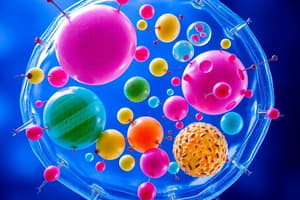Podcast
Questions and Answers
Organelles are the individual ______ of a cell.
Organelles are the individual ______ of a cell.
organs
The ______ is the control center of the cell.
The ______ is the control center of the cell.
nucleus
The nucleus is surrounded by the ______ membrane.
The nucleus is surrounded by the ______ membrane.
nuclear
The nucleus is responsible for ______ and contains the hereditary material.
The nucleus is responsible for ______ and contains the hereditary material.
The nuclear envelope is ______, and it is called nuclear pores.
The nuclear envelope is ______, and it is called nuclear pores.
The ______ is located inside the nucleus.
The ______ is located inside the nucleus.
Ribosomes are organelles that ______ proteins.
Ribosomes are organelles that ______ proteins.
Ribosomes are located in the ______ or the rough endoplasmic reticulum.
Ribosomes are located in the ______ or the rough endoplasmic reticulum.
The ______ is everything between the cell membrane and the nucleus.
The ______ is everything between the cell membrane and the nucleus.
The endoplasmic reticulum connects the nuclear membrane to the ______ membrane.
The endoplasmic reticulum connects the nuclear membrane to the ______ membrane.
The endoplasmic reticulum is used for ______ (movement of cell products).
The endoplasmic reticulum is used for ______ (movement of cell products).
The rough ER processes ______.
The rough ER processes ______.
The smooth ER processes ______ and ______.
The smooth ER processes ______ and ______.
Mitochondria are the ______ source of the cell.
Mitochondria are the ______ source of the cell.
Chloroplasts are found in ______ cells.
Chloroplasts are found in ______ cells.
The process of ______ occurs in chloroplasts.
The process of ______ occurs in chloroplasts.
The Golgi apparatus ______ and ______ cellular products.
The Golgi apparatus ______ and ______ cellular products.
Lysosomes are enzyme-coated organelles used for cellular ______.
Lysosomes are enzyme-coated organelles used for cellular ______.
Chromatin is strands of ______ material that will eventually form chromosomes.
Chromatin is strands of ______ material that will eventually form chromosomes.
The primary function of the ______ is for storage and is used to store water.
The primary function of the ______ is for storage and is used to store water.
The ______ regulates what enters or exits a cell.
The ______ regulates what enters or exits a cell.
The function of the ______ is to provide structure or support for the cell.
The function of the ______ is to provide structure or support for the cell.
______ cells do not have cell walls.
______ cells do not have cell walls.
______ , ______, and ______ do have cell walls, but they are all designed differently from each other.
______ , ______, and ______ do have cell walls, but they are all designed differently from each other.
Centrioles are ______ shaped or ______ shaped structures that are used to pull chromosomes apart during cell division.
Centrioles are ______ shaped or ______ shaped structures that are used to pull chromosomes apart during cell division.
Plants do not have centrioles but have similar structures called centrosomes.
Plants do not have centrioles but have similar structures called centrosomes.
Flashcards
String
String
A sequence of characters used to represent text. Think of it like a chain of letters.
Variable
Variable
A special symbol that represents a specific value in programming. It's a placeholder for data.
Algorithm
Algorithm
A set of instructions that tell the computer what to do. It's the code that makes a program work.
Integer
Integer
Signup and view all the flashcards
Float
Float
Signup and view all the flashcards
Command Line Interface (CLI)
Command Line Interface (CLI)
Signup and view all the flashcards
Scripting Language
Scripting Language
Signup and view all the flashcards
Data Structures
Data Structures
Signup and view all the flashcards
Function
Function
Signup and view all the flashcards
Conditional Statement
Conditional Statement
Signup and view all the flashcards
Study Notes
Cellular Anatomy - Organelles
- Nucleus: Found in the nuclear membrane, it controls cell reproduction and contains DNA, the hereditary material.
- Nuclear Envelope: Membrane surrounding the nucleus, containing nuclear pores.
- Nucleolus: Located inside the nucleus, manufactures ribosomes.
- Ribosomes: Produce proteins; located in the cytoplasm or rough endoplasmic reticulum.
- Endoplasmic Reticulum: Connects the nuclear membrane to the cell membrane; used for cellular transport.
- Rough ER: Processes proteins.
- Smooth ER: Processes lipids and carbohydrates.
- Mitochondria: Power source of the cell.
- Chloroplasts: Found in plant cells; site of photosynthesis.
- Golgi Apparatus: Packages and secretes cellular products.
- Lysosomes: Enzyme-coated organelles for cellular digestion.
- Chromatin: Strands of genetic material that form chromosomes prior to cellular reproduction.
- Vacuole: Primary function is storage; plants have one large central vacuole used to store water.
- Cell Membrane: Regulates what enters and exits a cell.
- Cell Wall: Provides structure and support; plant cells have cell walls, animal cells do not.
Cellular Anatomy - Other Structures
- Cytoplasm: Everything between the cell nucleus and membrane.
- Centrioles: T-shaped or barrel-shaped structures used in cell division. Animal cells contain centrioles, but plants contain similar structures called centrosomes.
- Fungi and Bacteria: Both have cell walls, but are structurally different from each other.
Studying That Suits You
Use AI to generate personalized quizzes and flashcards to suit your learning preferences.




